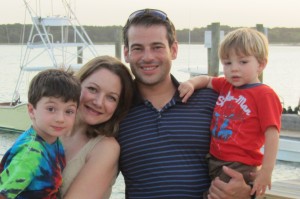“Life comes with many challenges.
The ones that should not scare us
are the ones we can take on and take control of.”
—Angelina Jolie
I’ve never considered myself a trendsetter, but after reading about Angelina Jolie’s bilateral mastectomy and reconstruction, that’s exactly how I felt. I could have written her story.
On Dec. 19, 2011, I made the same difficult decision as Angelina and underwent a prophylactic bilateral mastectomy.
Breast cancer runs in my family, on my father’s side. My decision to test for the gene came after my paternal aunt, a breast cancer survivor, previously diagnosed at age 43, told my father about the newly discovered BRCA genetic mutation. Their mother (my grandmother) had tragically lost her battle to breast cancer at age 49 after fighting the disease for four years. My dad was 14 years old at the time. In 2003, I tested positive for the BRCA1 gene.
I remember sitting in the office of the genetics counselor with my husband, Mike, by my side. The counselor explained what it means to have the BRCA genetic mutation. Most important to know is that those with the BRCA1 genetic mutation have an 85%–90% chance of being diagnosed with breast cancer and 50% chance of getting ovarian cancer in their lifetime. All I could think about is the terrifying fact that I have the same gene as my grandmother and aunt. If left alone, I knew I would eventually get breast cancer! Based on my family history, I knew that I would eventually have to have a mastectomy, but I couldn’t face it at the time, so I chose close surveillance.
I saw my breast surgeon regularly and had annual mammograms and MRI’s. As I approached my mid 30s, I became more anxious. I knew I was getting closer to having to face surgery or breast cancer, and I am not sure which I feared more. In 2010, when my cousin was diagnosed with breast cancer at age 41, I knew I was next. I went for my regular screenings, but didn’t know how to take the next step.
Thankfully my breast surgeon, Dr. Jennifer Reed, put me in touch with the local FORCE coordinator, Michelle Braun. FORCE (Facing Our Risk of Cancer Empowered) is a national organization founded for those who are fighting breast and hereditary cancer and those with the genetic mutation who seek support. FORCE is an amazing resource and includes a network of support groups, conferences, message boards, and more, all of which helped me to make an informed decision to have surgery.
When I started doing research, I was amazed at the advancement in mastectomy and reconstruction options. I learned that having a prophylactic mastectomy meant options like skin and nipple sparing and very real looking reconstruction techniques. The research helped me to feel empowered by my decision to have a bilateral mastectomy with reconstruction using tissue from my hips. The moment I came out of surgery, I knew I had made the right decision. The most difficult part was the anticipation of the surgery. After surgery, the relief of having it behind me made the recovery very manageable.
Experts estimate that less than 10% of the almost 1 million people in the United States with a BRCA mutation are aware of their high-risk status. We know that risk assessment and intervention can improve survival for high-risk individuals. But people cannot take action if they are unaware of their risk.
Due to the stigma of a mastectomy, I was hesitant to make my story public. However, when I realized that there may be many Jewish women in our community struggling with the same decisions that I faced with the BRCA gene, I realized the importance of sharing my medical journey. I also want to raise awareness of hereditary breast and ovarian cancer (HBOC) and increase access to the tools, information, and access to health care experts. The BRCA mutation is more prevalent among Ashkenazi Jews than any other population. About 1 in 40 people of Jewish decent have a BRCA mutation. Every high-risk person should have the education, support, and resources they need to make informed decisions about their risk.
I am so thankful to Angelina Jolie for writing about her decision. It is an amazing step for the awareness of hereditary breast and ovarian cancer and will hopefully help others to take the necessary steps to cancer prevention or early detection. You don’t have to have Angelina’s resources to take the steps that she did. Many insurance companies cover genetic testing when appropriate. If a BRCA mutation is found, surgery or closer surveillance options can also be covered depending on one’s insurance and plan. I truly believe knowledge is power and fear can be blinding. Taking the steps I have to protect my health for myself and for my family has been incredibly empowering.
For more information on FORCE or to attend a local support meeting go to: www.facingourrisk.org
by Carin Simon


